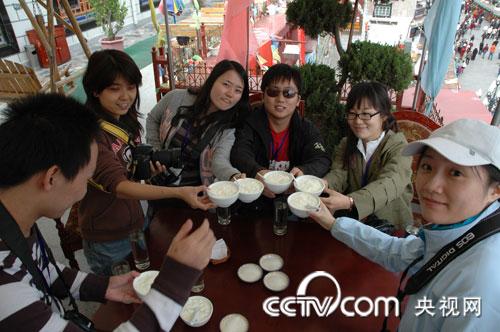Top 8 places for leisure and fun in Lhasa
If you have ever set foot on Lhasa, you should know that only touring this place once in your life time is far from being enough. Lhasa is not the same as it used to be, though it is still mysterious. Besides words such as "holy" and "pure," words like "modern" and "fashionable" can also be used to describe the city. If you plan to experience Lhasa's slow pace of life, you should not ignore the following eight places.
1. Chang (wine made from highland barley) bars
|
|
|
Undated photo shows a Tibetan was presented with wine made from the highland barley on a festive occasion in Lhasa, capital of southwest China's Tibet Autonomous Region. [Xinhua Photo] |
After fermenting for two days, the early morning is the time when the Chang (wine made from highland barley) of Tashi Tsering's house tastes best. The residents come to buy the Chang from the courtyards of Barkhor Street form an endless stream. Tashi Tsering is the son of a peasant family, and was a singing and dancing performer in the Kashag Aulic Troup when he was a boy. Then, he kept fighting against his fate, and became a scholar after studying in India and the U.S. After returning to Tibet, he is engaged in helping the children of Tibet's poverty-stricken areas to go to school. His life is actually a literary work full of circuitous and beautiful stories.
In a small courtyard in Muruningba, to the east of the Jokhang Temple, the Chang in the old man Lobsang's house is just as mellow as Tashi Tsering's. The only regrettable difference is that the output of the old man's Chang is not large, and the Chang he produces everyday is usually sold out in the afternoon. I call the old man Lobsang the "last tap dancer of Lhasa," because he was an early student of the scholar from the Tibet University Sonam Dajie Shrukhang, as well as an inheritor of the "Dui Xie" tap dance. In Lhasa, a lot of people can perform the "Dui Xie" tap dance, but the old man is the only person who inherited all of the 120 varieties of tap dances.
2. Sweet-tea houses
The varied tastes of sweet tea have enabled tea drinkers have their favorite tea houses. For example, a small tea house named "Zhaxixia," north of the circuit, is small in size but serves tasty sweet tea, so it has become a favorite place for businessmen on the street.
 |
|
Undated photo shows jouranlists from a media group drinking tea at a tea house in Lhasa, capital of southwest China's Tibet Autonomous Region.[Photo: cctv.com] |
There is a sweet-tea house in an alley linking the Great Mosque with the Canggu Nunnery, and people passing by tend to neglect its existence. Several young girls are often seen busy working in the tea house and the tea they prepare is not very sweet but exceptionally aromatic.
The girls in the tea house seldom enter the rooms to interrupt guests there, and they instead like to stand at the gate of the tea house with smiles on their faces that are as sweet as the sweet tea. If guests want to drink sweet tea or check in, they just need to speak one word, a waiter will immediately appear beside you.
Not far from the nameless sweet tea house, another sweet tea house opened at the Canggu Nunnery the year before last. Nuns boil tea, tend the kitchen fire and collect money. Just as in a big tea house, clients must go to the kitchen to fetch a cup. Meanwhile, clients must first buy a ticket if they want to buy tea weighing more than two pounds. It is interesting to drink at this tea house.
 0
0 



![Undated photo shows a Tibetan was presented with wine made from the highland barley on a festive occasion in Lhasa, capital of southwest China's Tibet Autonomous Region. [Xinhua Photo] Undated photo shows a Tibetan was presented with wine made from the highland barley on a festive occasion in Lhasa, capital of southwest China's Tibet Autonomous Region. [Xinhua Photo]](http://images.china.cn/attachement/jpg/site1007/20091214/000d87ad3cdd0c8fdbc202.jpg)





Go to Forum >>0 Comments